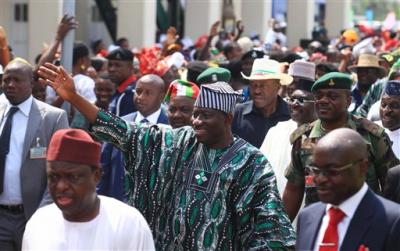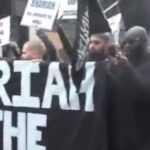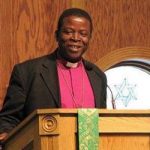After being tagged as favourite to win Nigeria’s presidential elections, Goodluck Jonathan’s campaign is faltering – despite the help of American strategists.
By Mark Dearn

It was through the death of Umaru Yar’Adua that “accidental president” Goodluck Jonathan became Nigeria’s head of state. And with a faltering campaign marred by low turnouts on the campaign trail further buffeted by prominent figures rallying behind what may become an opposition running on a joint ticket, the former overwhelming favourite may now need to live up to his name to retain office.
Former Minister of the Federal Capital Territory Nasir Ahmad El-Rufai told Think Africa Press that “it is unlikely that Jonathan will score 25% of the votes cast in enough of the 19 states to be a serious contender for the presidency”. In recent days Jonathan has also been hit by a series of broadsides which threaten to derail his campaign targeted at Nigeria’s burgeoning urban youth, and supported by American strategists from Trippi & Associates – who Think Africa Press can reveal are on the ground in Abuja.
Taking damage
First, former military ruler Gen. Ibrahim Babangida backed the bid for the presidency by Action Congress of Nigeria (ACN) candidate and former anti-corruption csar, Mallam Nuhu Ribadu. Babangida – whom Jonathan has said is “like a father” to him – stated that Nigeria is in need of a more youthful leader than Jonathan, arguing that “We have to allow generational change, which the ACN candidate represents”. And in a report attributed to well-positioned sources, it has been claimed that main opposition candidates Gen. Muhammadu Buhari of the Congress for Progressive Change (CPC) and Ribadu are to join forces and, after the outcome of this weekend’s National Assembly elections, decide who will stand as a unified opposition candidate against Jonathan.
Former president Olusegan Obasanjo reportedly left Jonathan “shocked” and “taken aback” after his final rally in Eagle Square, Abuja, when he said that zoning is enshrined in the PDP constitution – Jonathan controversially ignored the issue of presidential rotation between Muslims and Christians when he contravened the zoning pact by running for office. The issue is a key concern in winning the 58% of votes in the north of the country that could be crucial to a first round victory, and its resurfacing at the end of the campaign will do Jonathan no favours.
Jonathan has reiterated his hope for a clean election that would break from the legacy of the highly flawed polls recorded since 1999’s re-democratisation. However, the day before Jonathan stated that “nobody must manipulate votes in my favour”, Independent National Election Commission (INEC) chair Prof Attahiru Jega revealed that “several” high profile individuals registered more than once for voting. Jega opted against releasing the names, but the ACN claimed the culprits were most likely PDP members. The pursuit of a clean election was further hit when a Resident Electoral Commisioner in Anambra State told the press last week that he is under pressure to rig, claiming “My refusal to do the bidding of politicians has elicited malicious reactions from politicians”.
All this comes on the back of damaging allegations from Wikileaks and PDP rival and party founding member, Atiku Abubakar. Abubakar, a former vice-president, called on INEC to rule Jonathan’s victory against him in the primaries illegitimate after claiming Jonathan bribed delegates with $7,000 each to secure their votes, adding that Jonathan’s selection in place of a Northern candidate risked plunging the country into “lawlessness and anarchy”. Wikileaks claimed that Speaker of the House of Representatives Dimeji Bankole was reported to have told the US Ambassador that Supreme Court justices were bribed by a state governor to ensure victory for Yar’Adua and Jonathan in 2007, while Edo State governor Adams OShiomole was reported to have told US officials that Jonathan voted four times. Oshiomole denies ever making the claim and Jonathan has threatened to sue the publishing newspaper.
The “Facebook President”
While Nigerian elections historically favour incumbent presidents and the PDP has returned presidents in every election since the country’s re-democratisation in 1999, Jonathan none the less pulled out all the stops to carve out an innovative campaign to attract the votes of the some 40 million youths who account for the majority of the 73 million registered voters.
Much has been made of Jonathan’s presence on Facebook, where his tally of 500,000 “fans” is only surpassed by one other politician – Barack Obama. Jonathan’s staff have trumpeted that his engagement with Facebook and Twitter and use of voicemail on mobile phones is introducing a new dynamic between leaders and voters. In this they have been joined by Joe Trippi, the Democrat Party strategist who worked on the campaigns of several US politicians and also supported then ACP candidate Atiku Abubakar in 2007.
Trippi, who has had staff in Abuja assisting the Jonathan campaign for more than a week, argues that Jonathan launched his Facebook page to“deepen engagement with Nigerians and connect directly with citizens”. In an article published by the Huffington Post, Trippi says that Jonathan is “aggressively” trying to ensure elections will be free and fair, that he has already “shed much of the patronage politics that has plagued Nigeria’s young democracy”, and that his setting up and interacting with his Facebook page shows that Jonathan “understands that he holds his office to serve the will of the people”.
While Jonathan strives to give the impression that a clean election is of paramount importance to him, although he appointed the widely respected Prof Jega to INEC he has failed to instigate a reform of the rest of the organisation, did not relinquish his power to appoint or remove INEC chiefs, and did not remove INEC’s dependence on presidential funding. Trippi’s assertions about the withering of patronage politics are even more specious. Nasir Ahmad El-Rufai of the Good Governance Group (3G), a former head of Nigeria’s privatization agency, and a former ally of Ribadu and critic of the Jonathan presidency, told Think Africa Press that embedded patronage will play a key role in garnering votes.
Losing votes
El-Rufai said that, in his view, Jonathan will struggle to win the election with ease.
“Most of those that would vote for Jonathan are either from his part of the country or direct beneficiaries of the intensively rentier structure that has become the Nigerian state under Yar’Adua and Jonathan,” he said.
“The bulk of Northern voters are simply upset with him for denying and defying the PDP “zoning” arrangement already embedded in the Party Constitution.
“Many others, particularly in the South-West and South-East, will not vote for Jonathan because he comes across as an uninspiring, weak and incapable leader. In his 12 months or so in the saddle, the nation’s economy has been pushed to near distress – the Excess Crude Revenues Account has been frittered away, reserves have gone amidst rising oil prices, and fiscal indiscipline has been high. Insecurity levels have risen all across the nation without any adequate response.”
Indicative of the malaise El-Rufai points to is the Excess Crude Account, which functions as a stabilization fund filled with money from oil revenues. Although funds from it have been used for boosting electricity generation and providing stimulus for the economy, some $22 billion was unaccounted for by February this year, with the money believed to have been withdrawn by state governments: earlier in the year, Jonathan approved the sharing of some $2 billion for states due to their support of his presidency. A financial consultant who has advised the Nigerian government told the New York Times: “It’s basically free money. Once you get it, there are no checks and balances on what happens to it.”
To rig, or not to rig
Since Jonathan’s chances of winning are now no longer quite as certain as had previously been thought, attention will focus on INEC’s role in insuring a clean election and perceived attempts at rigging by the PDP. The combination of an escalation in inter-ethnic violence over the past year and Jonathan’s contravention of the zoning pact mean that any perception from Northerners that the South has rigged an election to retain power could be met with violence and a national crisis.
One of Nigeria’s most prominent human rights lawyers, Femi Falana, has hinted that action on the streets may be the best option in the case of a stolen election.
“If expectations of Nigerians concerning a credible poll in April are not met, I am very convinced that the crisis that will come up will not be solved in any law court but on the streets,” he said. “People should guard their votes jealously and ensure that their votes are not stolen by those who are bent on keeping them in bondage forever.”
There will be many in Nigeria and beyond who will be hoping Falana’s predictions will not be put to the test.

